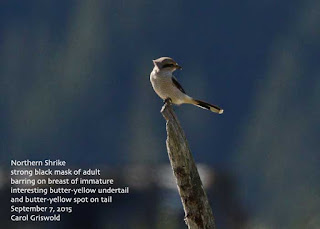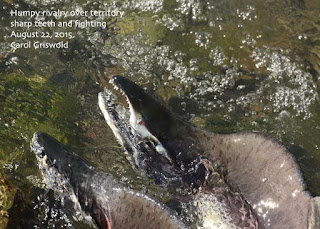Seward, Alaska
Sunrise 7:06 am, sunset 8:43
pm for a total day length of 13 hours and 36 minutes. Tomorrow will be 5
minutes and 24 seconds shorter.
Outstanding weather today:
sunny with a light southerly breeze and a surprisingly warm high of 64º. A
waning crescent moon sailed across the blue sky, playing peekaboo with the puffy
white clouds. The mountainside alpine blueberry and bearberry patches recently
switched from summer green to fall maroon and red, a visual clue that freezing
temps are not far away. Rain is forecast for the rest of the week; look for
termination dust on high.
I heard a distinctive “keck,
keck” at the head of the bay this afternoon and found a female RUSTY BLACKBIRD
in the wetlands. She flew to some spruce trees, followed by one other. It was
exciting to see them; maybe there are more, as they seem to travel in larger
flocks.
While watching the blackbird,
another bird flew up and hovered, wings beating furiously, then landed on a nearby
snag. A beautiful NORTHERN SHRIKE! I think it was hunting dragonflies, not Blackbirds.
The Shrike had the sharp black mask of an adult, but retained the fine barring
of an immature bird from the neck to its unusual lovely, butter-yellow
undertail coverts. Another large butter-yellow spot marked the underside of the
long dark tail. I could not find any references to this yellow color. Any
thoughts?
BELTED KINGFISHERS are
feasting on small fingerlings as noted at the Lagoon in town and at Bear Lake.
While kayaking today at Bear Lake, I spotted at least 5 chattering along the
shore, chasing each other, and diving into the clear water. A few spawning
sockeyes, as red and maroon as the mountainsides, swam through the pondweed
(Potamageton sp) and water horsetails.
A COMMON LOON paused briefly
and dove with a soft splash. I haven’t seen a loon in a very long time, so it
was a real treat. The loon family hatched one chick this summer, the first in
many years. It was spotted by locals on June 21, swimming between the parents but
by June 28th, it was no longer with them. Eagle predation is a huge
factor in the low survival rate, as is disturbance of the nest site and
swamping by boat wakes. A loon nesting platform with a canopy, and restricted access might help reduce
some of these dangers.
As expected, a juvenile BALD
EAGLE strode along the beach with many salmon carcasses to choose from, and others
chortled from the trees or soared overhead. GLAUCOUS-WINGED and MEW GULLS, and
BLACK-BILLED MAGPIES also enjoyed the easy feast. Small family groups of COMMON GOLDENEYES, one
RED-BREASTED MERGANSER, and RED-NECKED GREBE paddled nearby, attracted by the
salmon, big and small.
A RUBY-CROWNED KINGLET sang
its loud, long, spring song from the forest edge, while its cousins, the
GOLDEN-CROWNED KINGLETS called in their high little voices. The first will soon
migrate, the second will remain to face winter.
Later in the evening I caught
a glimpse of a MERLIN chasing STELLER JAYS and BLACK-BILLED MAGPIES around the
yard. Wish I could have seen more, but it was a fast chase scene.
After a fairly slow August,
it was a very exciting September day.
Happy Birding!
Carol Griswold
Seward Sporadic Bird Report
Reporter




















No comments:
Post a Comment